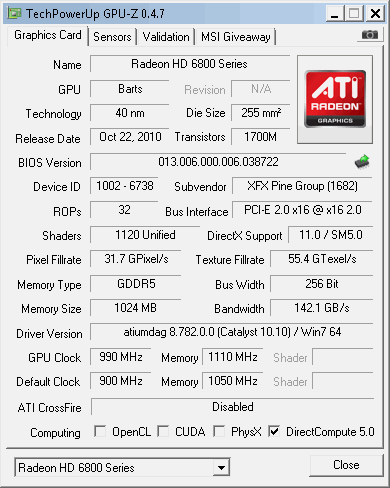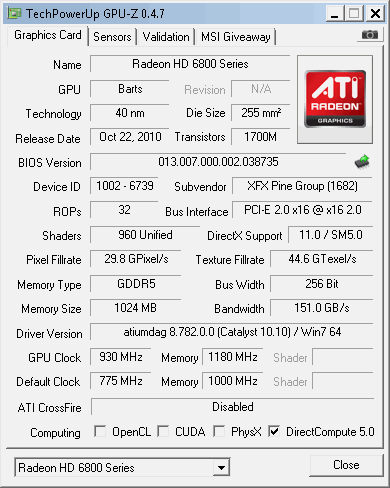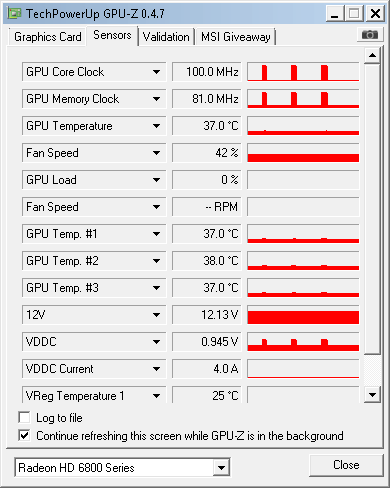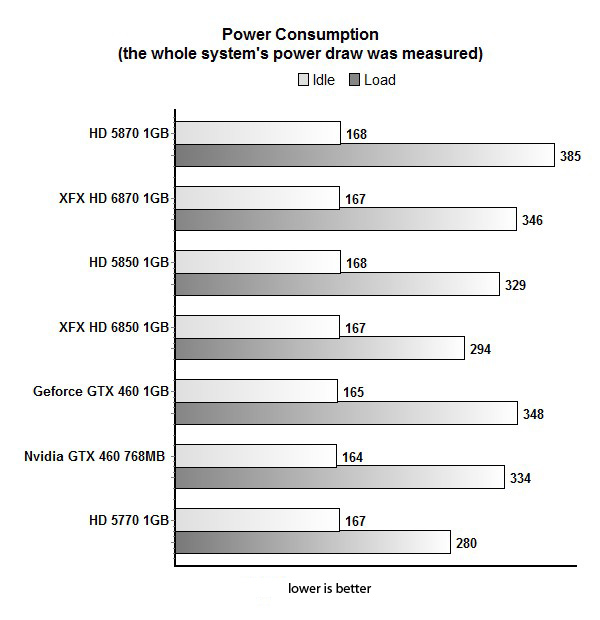Index
Page 6 of 7
HD 6800 Overclocking
HD 6870’s reference clocks are 900MHz for the GPU an 1050MHz for the memory, and our today’s XFX cards use reference design. CCC Overdrive limits the clocks to 1000MHz for the GPU and 1250MHz for the memory, so we relied on MSI’s Afterburner for our overclocking. We managed to hit 1010MHz for the GPU but only after we increased the fan RPM to 55%, where the fan ran pretty loud.
We managed to hit 990MHz for the GPU and 1100MHz for the memory by running the fan in AUTO mode, and it resulted in 8% better results in Aliens vs. Predator. Had the HD 6870 been just a tad bit louder during our tests (AUTO fan mode), we’d call the card loud, but it still isn’t unbearable.
On the other hand, the card is quiet when idle.

XFX HD 6850 is also a reference clocked card – the GPU runs at 775MHz, shaders at 775MHz and the memory at 1000MHz (4000MHz effectively). The card allowed an overclock to 930MHz GPU and 1180MHz for the memory and it resulted in 18% better results in Aliens vs. Predator.

Fan noise
XFX HD 6870 is pretty quiet when idle, and it doesn’t get loud during gaming either.
The XFX HD 6850, on the other hand, gets loud both when idle and when gaming and it is definitely louder than XFX HD 6870. The BIOS sets the fan to 42% RPM in idle mode making the card pretty loud. Furmark testing caused the XFX HD 6850 temperatures to go up to 65 degrees Celsius, which speaks volumes on the cooler's quality. Furthermore, it also means that you can sacrifice a couple of C and make the card quieter.

XFX HD 6870 didn’t go over 84°C during our tests. The cooler was almost inaudible in idle operation (43°C), and while it gets louder in FurMark tests, it isn’t too loud. Of course, fan speed can be controlled via Catalst Overdrive.
Consumption
Faster cards usually have two 6-pin PCIe power connectors but the HD 6870 had to have two. A single Watt that is the culprit, as the card will draw 151W while one connector can supply “only” 150W. However, the additional power connector allows for overclocking beyond 900MHz.
The slower HD 6850 comes with one 6-pin power connector. As you probably already know, Barts XT and PRO chips’ die size measures 255mm2. HD 6870 consumes 19W in idle and 151W during operation whereas the 6850 draws 19W when idle and 127W during operation.
We measured our entire rig's consumption after stressing the graphics with FurMark. The tests show that HD 6870’s consumption is similar to the GTX 460 1GB.




